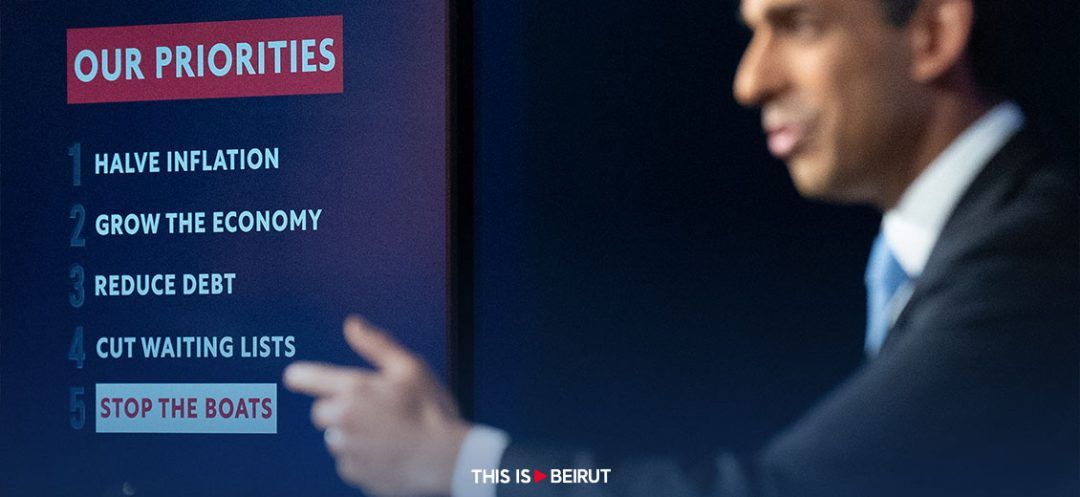- Home
- Middle East
- UK: Will Rwanda Immigration Bill Prevent Tories' Demise?

The approval of the "Safety of Rwanda" immigration bill by the Rishi Sunak-led British government was anything but a mere legislative formality, but rather the outcome of a fierce political battle that unfolded over four months. For the Conservative Party, this fight isn’t just about addressing illegal immigration, as it also holds personal significance for the prime minister. This initiative represents a crucial challenge for Sunak as he strives to strengthen his position against a looming threat: the imminent prospect of a crushing defeat to the Labor opposition in the general elections, scheduled for the upcoming months. Surveys conducted by the YouGov institute show that immigration ranks third among the major concerns of British voters, following closely behind healthcare improvement and economic recovery. In this context, the adoption of this law raises a crucial question: Could it be possible that if implemented, this legislation might save a prime minister grappling, albeit unsuccessfully, with his unpopularity?
A symbolic law at this time
However, it's essential to grasp the essence of this highly controversial bill. The agreement between the United Kingdom and Rwanda is designed as a partnership aiming to relocate individuals who have illegally immigrated to the UK to this East African nation, characterized by a dynamic economy but governed by what’s deemed as an authoritarian regime. Under this accord, these individuals will only be able to apply for asylum from Rwandan territory, where their cases will be reviewed, effectively transferring the bulk of asylum responsibilities away from the UK. Moreover, this move entails substantial financial cooperation, with Rwanda having already received around £500 million.
Now that the bill has been approved, a crucial question arises: Is it too little, too late for the Tories? It's essential to differentiate between the mere adoption of a bill and its actual implementation. Although the formal (royal) consent of this legislation has been granted, flights to Rwanda are not set to leave anytime soon and could be delayed for up to ten weeks at the earliest. Nevertheless, the government aims to capitalize on the symbolism aspect by trying to secure an inaugural flight to Rwanda before the general elections. However, it's clear that assessing the outcomes of this new law will require several months, making it challenging to evaluate before the general election deadline. Thus, at this point, the Sunak administration, running short on options, seems to prioritize symbolism over tangible outcomes.
Yet it is important to mention that the unpopularity of the Conservative government extends far beyond its mishandling of the Rwanda immigration bill. It encompasses economic mismanagement, and maybe more significantly, the governance chaos that has prevailed since the Brexit referendum in 2016, particularly in the past few months of Boris Johnson's leadership. Indeed, alongside global crises like the COVID-19 pandemic and the conflict in Ukraine, the British public has been witness to repeated scandals involving their leaders, from Boris Johnson's Partygate scandal to Liz Truss's brief and tumultuous stint in power, which only lasted 44 days.
Starmer ahead in the polls
Today, the Conservatives have become the easy target for all the woes afflicting the UK, regardless of whether they bear responsibility. Indeed, recent polls indicating a 21% rise for the Labor opposition seem to corroborate this sentiment. The public weariness with the chaos of recent years is palpable, exacerbated by the deep-seated divisions within the party itself, spanning from its moderate to radical wings. This internal strife has triggered an ongoing fratricidal conflict among different factions of the Conservative Party, each fervently deflecting blame onto the other for any perceived failures.
In this context, the much-needed unity – essential for even the slightest chance of survival in the general elections – seems highly unlikely. The Labor Party's sweeping victory in the municipal elections on May 2nd highlights this challenge. Nonetheless, projections by the British media outlet Sky News suggest that Labor may only secure a narrow majority in the upcoming elections – a statistic the Conservatives will likely leverage in their efforts to reverse the tide. However, even as Rishi Sunak, celebrated as a skilled figure and technocrat, tried to unite his party, he seems to be bearing the consequences of the Tories' shortcomings since 2010. Despite his successful efforts to stimulate the economy and curb inflation, voters, as often observed in advanced democracies, seem to have opted 14 years later for a change in government.
The Labor Party, led by opposition leader Sir Keir Starmer, currently dominates all polls. Nevertheless, numerous observers argue that the success of the opposition rests solely on the failures of the current government. While Starmer undeniably lacks the charisma of some of his predecessors, such as Tony Blair, he has succeeded in unifying a party discredited and disrupted by the highly controversial leadership of Jeremy Corbyn. However, his electoral plan remains partially vague, offering no concrete solutions to the challenges facing the British people. Amidst a financial crisis, Starmer offers several unfunded measures, including an increase in state spending and ambitious environmental initiatives. Such proposals can only be financed through borrowing, which conflicts with the Bank of England mandate for the current government to reduce borrowing, or increase taxation, potentially reducing the spending power of ordinary Britons. Moreover, the Labor opposition has yet to present a concrete plan to address illegal immigration, possibly due to concerns about alienating the party's radical left wing.
In short, the immigration bill regarding Rwanda seems to be a desperate effort by the Conservatives to stave off an impending defeat in the upcoming elections. "Too little, too late," echoes through the corridors of power. Meanwhile, the Labor opposition, while lacking concrete convictions and a coherent plan, has adeptly exploited divisions, scandals, and the myriad failures of the Conservatives over the past fourteen years. Presently, there appears to be no promising prospect in sight for the Tories, casting a shadow of inevitable defeat.
Read more




Comments